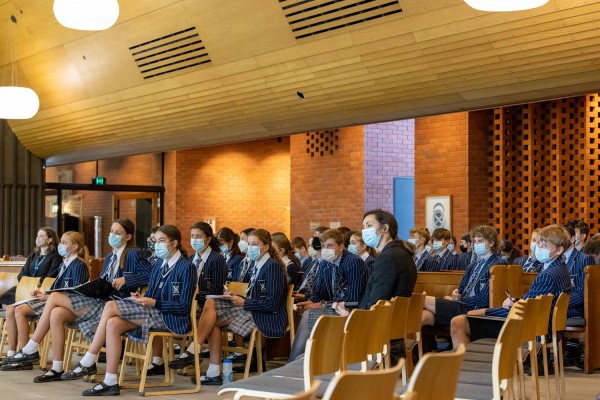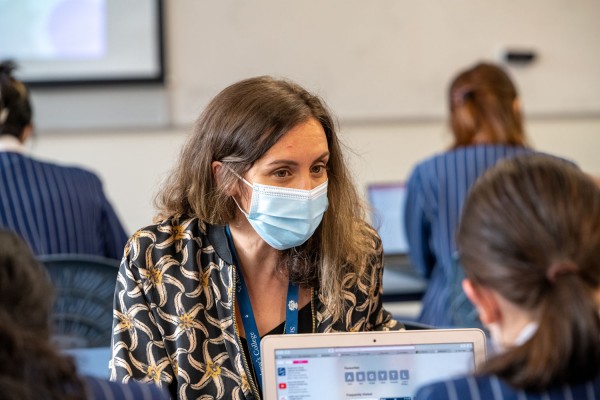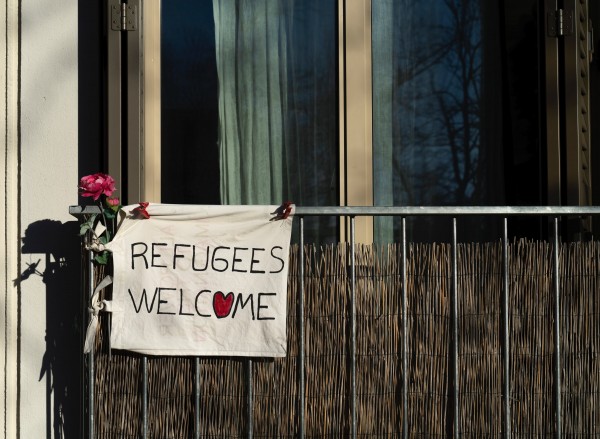
You are logged in as
Logout
You are logged in as
Logout
Heart-breaking. Inspiring. Distressing. Faith-restoring. Anxiety-provoking.
The news and social media posts from Ukraine and neighbouring countries are all of the above, and more.
The pace of the crisis in Ukraine has created a frenzy for anybody who wants to understand what is going on. Over the past weeks, I have listened to students grapple with life as they know it, witnessing photos of young Ukrainians, the same age as them, facing the sad reality of war. Sadly, 'doomscrolling' is back in ways that we have not seen since the beginning of the global pandemic.
The stream of information is powerful: it forces us to pay attention and gives us insight into the desperate situation of the Ukrainian people. Students are not only watching the crisis unfold through traditional news sources, but also social media platforms such as Instagram and TikTok. As of Tuesday 15 March, there are 33.4 million posts using #Ukraine on Instagram and there have been 29.4 billion views of videos with #Ukraine on TikTok. These platforms show raw footage of the realities of warfare and heart-breaking personal stories of impacted victims.

It is not hard to feel helpless in the face of what’s happening in the world. We are living through a global pandemic, wars, political and economic instability and are witness to significant and pressing global issues such as climate change and environmental devastation. It’s a lot to process.
It is important that adults don’t avoid engaging in challenging conversations about what is happening in the world. Teachers and parents need to be prepared to answer the questions young people have with facts that provide context and aid understanding. While it is important to be honest, the level of detail will vary between a seven-year-old and that of a 16-year-old. Head of Social Studies, Valerie Eves, emphasises that we should aspire to help older students build critical thinking skills and see the conflict in a wider historical and political context.
Psychologists have researched the toll that media coverage is having on mental health. University of Cambridge Professor, Barbara Sahakian, acknowledges how doomscrolling can exacerbate anxiety and depression. She notes there is a difference between staying informed and obsessively scrolling through news updates throughout the day and night.
Her research suggests that we need to gain mastery and control around how we consume information and that no one benefits by people being so overwhelmed or cognitively depleted that they cease to function. We need our young people to stay hopeful and focused on becoming future problem solvers who can positively impact issues such as climate change and conflict. In this vein, it is essential that parents create and uphold boundaries around social media access. You can read more about social media and adolescents here.

We live in a world where media dominates. Events and topics are selected and worded to incite the greatest numbers of readers, viewers or followers. Sadly, this means content can be biased, sensationalised, emotionally loaded or misleading, especially on social media platforms. In this article, the BBC reports on a growing spread of misinformation about Ukraine including false videos and conspiracy theories.
It is crucial that our young people develop the skills to think critically about the information they consume. In Years 9 and 10 Social Studies, all students are taught the explicit skill of evaluating credible sources. Head of Social Studies, Valerie Eves, describes how the focus is on getting students to think carefully about where information is coming from and about what the purpose is for.
The current situation in Ukraine is heart-breaking and provides a context encouraging students to develop empathy. In my Geography classes, I have been touched by how our young people are visibly empathising with the Ukrainian people. Empathy involves thinking, feeling and even having a physical reaction relating to how another person feels.
Children learn how to notice, listen, and care by following role models, so it is important we are open to our emotions and talk about how we are feeling too. Are we feeling anger, sadness, hope or grief or is it vulnerability or overwhelm? It’s about modelling emotional intelligence and developing our emotional vocabulary so we can learn, connect on a deeper level and become more self-aware.

Head of Social Studies, Valerie Eves
When the news is dominated by distressing images and content, it is more important than ever to seek out the good. Amongst the sad stories, there are also inspiring stories of people showing incredible strength of character in the face of adversity. From Volodymyr Zelensky’s leadership and the courage and perseverance of the Ukrainian people, to stories of the kindness and compassion of strangers.
Images of international solidarity show landmarks around the world lit in blue and yellow, protesters such as Marina Ovsyannikova take a stand, strollers are left for mothers at Premsyl Railway in Poland and Berlin Railway Station is full of Germans welcoming refugees with hugs, flowers, and a warm bed. These stories restore faith and build hope in humanity. Seek them out.

We should be supporting our young people to think about the small steps they could take to make a difference. This helps them move from a sense of helplessness to agency. Compassion is different from empathy. Compassion involves being moved by suffering in a way that motivates you to take action to alleviate it. It’s about helping others. I have spoken to students who along with their families are making donations to the Ukrainian Red Cross, charities supporting refugees, and also to animal shelters in Ukraine.
We have had a lot to process in the last few years. The influx of a constant stream of distressing information can take its toll if we are not conscious about setting boundaries and choosing where we focus our attention and how we step into action. I am reminded of Neurologist Viktor Frankl’s wise and hopeful words in these challenging times:
“Forces beyond your control can take away everything you possess except one thing, your freedom to choose how you will respond to the situation.”
How are you supporting your children to stay hopeful?
Kerry Larby Head of Well-being and Positive Education